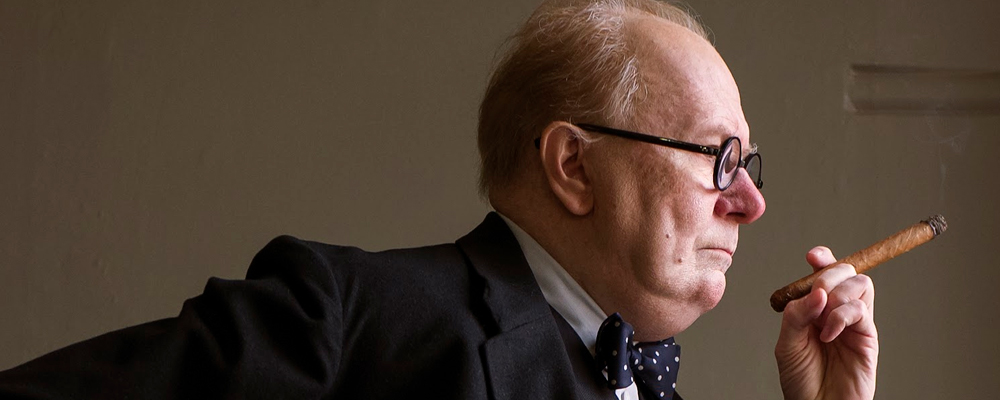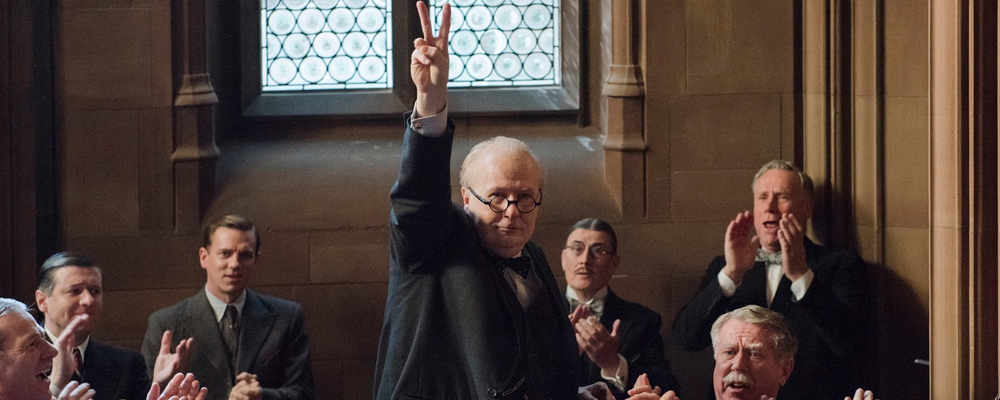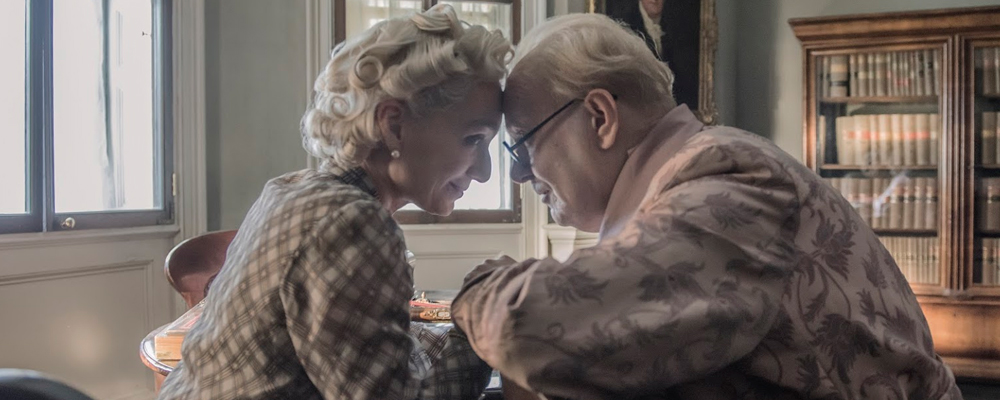‘Darkest Hour’ Elegantly Takes You Into the War Room
Alci Rengifo
Like a great, thinking machine Winston Churchill faces the coming storm of World War II in “Darkest Hour,” a magnificent new epic from Joe Wright. By now the Second World War has become one of the standards in our cinematic storytelling culture. And why not? It is history on a titanic, human scale. Here Wright delivers a grand drama about the sheer political struggles that defined England’s role in the early days of the war and Churchill’s fierce determination to beat back calls for negotiating with Hitler. Gary Oldman plays Churchill with a breadth and force so convincing, the marquee name absolutely disappears behind the character. Nothing he has ever done before will prepare you for what Oldman achieves in this film.
It is 1940 and Nazi Germany has begun its invasion of Western Europe. Inside the British parliament the noose has tightened around Neville Chamberlain (Ronald Pickup) and a new prime minister must be selected. There is only one choice that can unite the Conservative and Liberal wings of the house, and that is Winston Churchill (Oldman). We first meet him as he welcomes his new assistant, Elizabeth Layton (Lily James), who nearly runs out in tears after he berates her for typing a message with the wrong spacing. As war clouds gather there is much uncertainty over Churchill, who is known for his abrasive style of politics and rash foreign policies going back to the Russian Civil War. Even the king, George VI (Ben Mendelsohn), warns Churchill that he’s a difficult man. Only his wife Clementine (Kristin Scott Thomas) seems to have the iron will to understand (and tolerate) him. But Churchill is stubborn and warns that England and her allies must put up a strong, united front to stop the Nazi threat. He meets with the French, who already seem defeated, and attempts to marshal forces. The first chapter of the war culminates in the beaches of Dunkirk, where allied forces find themselves surrounded by the Germans. As the situation gets critical, Churchill finds himself surrounded by foes in the war room demanding he negotiate with the Axis powers.
“Darkest Hour” is a production elegantly mounted in the British tradition, combining visual lushness with a witty, intelligent screenplay by Anthony McCarten. There are many grandiose gestures in the filmmaking that turn the movie into a living work, not a mere recounting of historical events. Wright opens with an overhead shot of the House of Commons in fierce debate, swooping into the action and making political discourse look exciting. The camera tracks with a fierce energy as Churchill makes his way through the halls of power. A sense of urgency is built which captures the mood of the times. In one scene Churchill sits in his war time bunker to deliver a radio address to the nation and when the red light signaling him to begin turns on, the entire room is cast in an infernal, hot glow that evokes the strain of the moment. The best historical dramas are made when directors are aware that they are still making cinema,
“Darkest Hour” is Joe Wright’s best film since 2007’s “Atonement.” Wright’s last few projects had visual flare but lacked more substance. But after a highly successful gig directing an episode of Netflix’s “Black Mirror,” Wright seems to be back in shape and with “Darkest Hour” delivers a highly engaging, insightful experience. The screenplay by McCarten is full of eloquence but also the grit of political infighting. Suspense is generated through the clash of wills, the scheming of chess moves and backdoor negotiations. In one tragically comic scene Churchill sequesters himself in a room to call Franklin D. Roosevelt and ask for bomber planes England has already paid for. FDR informs his colleague that U.S. neutrality prevents delivery of the planes, but they can be dropped off near the Canadian border if Churchill can get some horses to pull them across. Wright also visually and dramatically delivers absorbing details about the world of these characters. He shows us how a speech is composed and edited, demonstrating how famous public moments are not always spontaneous but crafted like theater.
But what makes “Darkest Hour” is the astounding performance by Gary Oldman. His Churchill is not a flawless icon, but a man intoxicated by politics yet weighed by the realities of power in wartime. Oldman uses great subtly, allowing the flaws and insecurities of the man to appear even as he delivers speeches with great eloquence. He isn’t a man of the people, but a sharp aristocrat pulled down the ladder by events. In one memorable scene he rides the London subway to simply ask the common people if they are willing to fight. His temper is monstrous and he confesses to King George, “My emotions are unbridled. It is a wildness in the blood.” Yet because he’s so difficult, it’s even more rousing to see him rise to the occasion and will his country into combat. Oldman has transformed before into major historical figures ranging from Beethoven to Sid Vicious to Lee Harvey Oswald, but here he reaches new heights, becoming almost unrecognizable.
The rest of the cast meets the occasion with focus. Kristin Scott Thomas is refined strength as Clementine Churchill, with a cooler head that sees through Churchill’s bombast. Ben Mendelsohn’s King George VI is pure nervousness hiding behind practiced composers. Churchill’s great rival is Viscount Halifax, played by Stephen Dillane with stealth resentment.
“Darkest Hour” might be seen as a companion to Christopher Nolan’s “Dunkirk,” but while that was a film of pure action and sonic experience, this is a fascinating portrait of the political battles behind great events. Wright has made a film of great words and visual elegance, but fueled by what is one of the year’s greatest performances.
“Darkest Hour” opens Nov. 22 in select theaters, nationwide Dec. 22.



